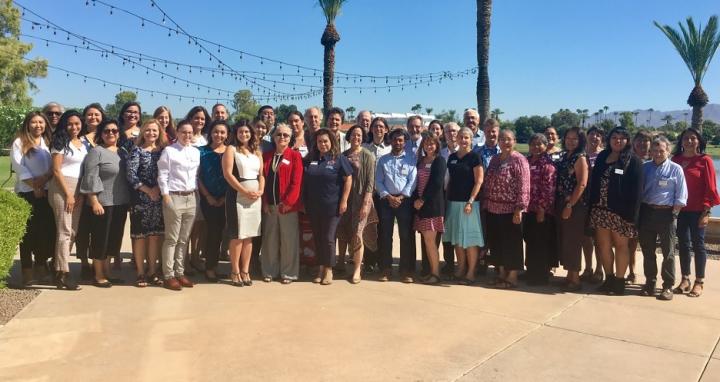Since 2002, the University of Arizona Cancer Center and Northern Arizona University have received funding from the National Cancer Institute to form the Partnership for Native American Cancer Prevention, addressing the cancer burden on Native Americans.

Credit: UArizona Health Sciences
TUCSON, Ariz. – The University of Arizona Cancer Center has been awarded $6.85 million to continue its efforts in cancer research, training and outreach programs serving Arizona Native American communities.
Since 2002, the UArizona Cancer Center has partnered with Northern Arizona University through the Partnership for Native American Cancer Prevention (NACP) to alleviate the unequal burden of cancer among Native Americans. NACP is one of 16 National Cancer Institute (NCI) Partnerships to Advance Cancer Health Equity (PACHE), but the NACP partnership between the UArizona Cancer Center and NAU is the only one dedicated solely to the Native American population.
“As the only NCI Comprehensive Cancer Center based in Arizona, we have a commitment to the disparities in cancer care throughout our state,” said Joann Sweasy, PhD, interim director of the UArizona Cancer Center. “We are very encouraged by what NACP has accomplished in addressing health disparities and the cancer burden in our Native American communities. However, we will be able to do so much more now that NACP is funded for five more years. We appreciate the tremendous support we have received from many people in our pursuit of this award, including U.S. Sen. Martha McSally, so that we can continue to provide the latest treatment, care, prevention services and training to Native Americans in Arizona.”
The new funding, awarded through a U54 grant, extends the NACP partnership for five years through 2024. NACP will advance its efforts to train students and health-care providers working in cancer research in Native American populations. One of the aims is to support Native American early-stage investigators to become independently funded researchers and increase the Native American biomedical workforce.
“NACP has been uniquely successful in three distinct areas: training, outreach and research,” said UArizona Cancer Center research administrator and NACP program manager, Maria Lluria-Prevatt, PhD. “We will continue to focus on these key areas as we strive for meaningful progress in reducing cancer health disparities in Native American communities.”
“This partnership exemplifies the power of collaboration to address the cancer burden throughout our state and beyond,” said UA President Robert C. Robbins, MD. “The talented team of investigators and researchers at the UArizona Cancer Center continues to make an impact for countless communities throughout our state. We are honored to partner with and to serve Arizona’s Native American nations, and the NACP’s impressive history of care and education is a particular source of pride.”
To date, NACP has trained more than 275 Native American undergraduate and graduate students in cancer research, with a graduation rate of 68% — far higher than the highest reported national average of 38%. In addition, 79% of Native American students in the NACP program either attained a degree or are working toward one. Of that group, 21 students have earned doctoral degrees, with nearly 70% of trainees with a doctorate serving in Native American communities or contributing to Native American cancer research.
“We want Native American students to experience firsthand the excitement of biomedical research as we encourage them to focus on cancer health disparities,” said Margaret Briehl, PhD, the UArizona Health Sciences principal investigator for the NACP partnership and associate director for cancer research career enhancement and related activities at the UArizona Cancer Center. “A major goal is to see these trainees become researchers or clinical providers addressing cancer impacting their own communities. We are seeing progress in this area through the efforts of NACP.”
The NACP has engaged with 14 of the 22 recognized Native American tribes in Arizona and has obtained 13 tribal council or Internal Review Board approvals by Navajo, Hopi and White Mountain Apache tribes for research projects.
A critical research endeavor for NACP is to study the prevalence of Helicobacter pylori infection (inflammation and ulcers in the stomach or small intestine) and the increased risk of stomach cancer for Native Americans. For Native Americans living in Northern Arizona, stomach cancer is the leading cause of cancer-related deaths, and stomach cancer incidence rates are three times as high, compared to the general Arizona population.
Research also will explore “triple negative breast cancer,” a common cancer that disproportionally affects Native American women, a population that also experiences higher cervical cancer rates, which translational and clinical researchers intend to study.
###
Past and ongoing research has examined the presence of uranium on Navajo land and its potential to increase risks for cancer. Additional collaborations include improved breast cancer screening rates among Hopi, the Navajo Nation’s second multi-year Cancer Health Report and physical activity intervention programs for cancer survivors.
Research reported in this publication was supported by the National Cancer Institute of the National Institutes of Health under the awards for the Partnership of Native American Cancer Prevention U54CA143924 (UArizona Cancer Center) and U54CA143925 (NAU).
Media Contact
Blair Willis
[email protected]
520-626-0331
Original Source
https:/




